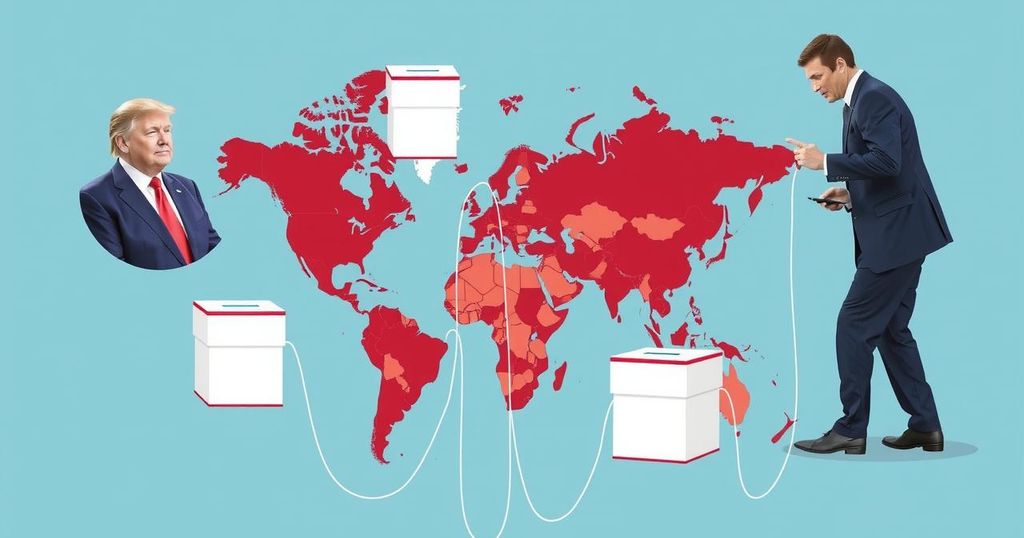In 2024, over 70 national elections occurred worldwide, affecting more than half of the global population. A substantial shift saw incumbent parties lose seat shares, with over 80% of democracies witnessing declines. Notably, discontent with the economy, political alienation, and societal issues influenced voter behavior. Despite some victories for incumbents, many faced reduced support signals a potential ongoing trend against established political norms as the world approaches elections in 2025.
The year 2024 witnessed a global wave of electoral participation, as over 70 national elections transpired, impacting more than 50% of the global population. Notable among these elections were those held in major democracies such as India, the United States, Indonesia, and Bangladesh, alongside the elections for the European Parliament involving 27 member states. According to the International Institute for Democracy and Electoral Assistance (International IDEA), over 1.6 billion ballots were cast during these elections.
The electoral landscape of 2024 was characterized by a significant decline for incumbent parties across both developed and developing nations. An analysis reported by the Financial Times indicated that every incumbent party in developed nations experienced a loss in vote share, a phenomenon not observed in nearly 120 years. Moreover, the analysis by ABC News’ 538 revealed that over 80% of the countries studied suffered losses in seats or vote shares for the incumbent parties, irrespective of their political orientation.
The political shift was evident across the spectrum. In the United States, former President Donald Trump reclaimed battleground states, while in Portugal, the center-right Democratic Alliance gained ground. Conversely, leftist parties capitalized on the dissatisfaction with incumbents, securing victories in contexts as varied as South Korea and the United Kingdom, where the ruling Conservative Party suffered a decline in voter support.
Although some incumbent parties managed to retain power, they did so with diminished majorities—such was the case for Narendra Modi’s Bharatiya Janata Party in India. Other nations like Japan, South Africa, and France exhibited similar trends of declining support for the ruling parties. In contrast, less democratic nations often witnessed tightly managed electoral outcomes, exemplified by Rwanda’s President Paul Kagame winning 99% of the votes amid an uncompetitive environment.
In Bangladesh, despite Prime Minister Sheikh Hasina securing reelection in a boycotted vote, the margin was notably reduced, culminating in her eventual ousting later in the year. Iran, typically under stringent control, saw a surprising shift towards moderacy with the election of Masoud Pezeshkian over the hardliner Ibrahim Raisi.
Analysts attribute these electoral outcomes to widespread dissatisfaction with the global economy, particularly escalating costs of living and other societal issues including migration and pandemic repercussions. Mexico stood out as an exception, where incumbent Claudia Sheinbaum was endorsed due to positive economic sentiments among voters.
A Pew Research Center survey indicated growing disillusionment with democratic institutions. While a significant majority still deemed representative democracy a good system, 59% expressed dissatisfaction with their country’s operations. Many felt unrepresented by political parties, which contributed to a sense of alienation and frustration among voters.
The context of the electoral upheavals in 2024 is rooted in widespread global discontent with political incumbents amid economic challenges and social issues. The dissatisfaction among voters has been exacerbated by factors such as inflation, migration crises, and the lasting effects of the COVID-19 pandemic. The unusual swings in voting patterns across diverse democracies indicate a larger trend of discontent that transcends geographical and political boundaries.
The electoral outcomes of 2024 reflect a significant global trend against incumbent parties, driven chiefly by voter dissatisfaction with governance and prevailing economic conditions. As we approach the electoral landscape of 2025, it remains to be seen whether this anti-incumbent momentum will persist or if new dynamics will reshape the political arena. The impending elections in several countries will be critical in determining the future trajectory of global democracy and electoral sentiment.
Original Source: www.voanews.com






